 Abengoa
Abengoa
Annual Report 2012
- Corporate Governance
- Annual Report on Corporate Governance
- Structure of the Administration of the company
B. Structure of the Administration of the company
B.1 Board of Directors
B.1.1 Indicate the maximum and minimum number of board members stipulated in the company Bylaws:

B.1.2. Complete the following table with the Board Members:
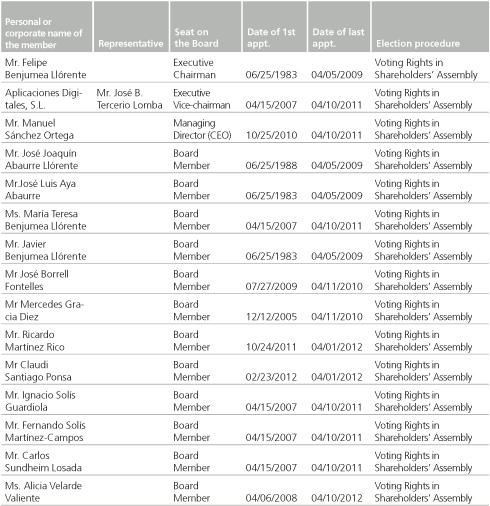
Total number of Board members 15
Identify any members who left the Board of Directors over the period:

B.1.3. Complete the following tables on the members and their different conditions:
Executive board members

Total number of Executive Board members 3
Total % of Board: 20%
External Dominion Board Members
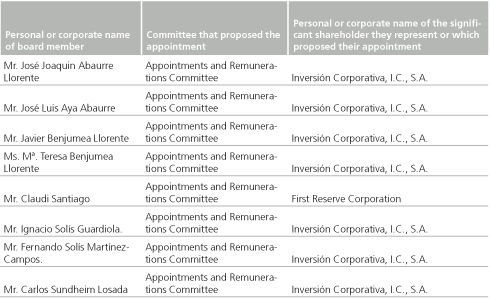
Total number of Dominion Board members 8
Total % of Board: 53,33%
External Independent Board members
Personal or corporate name of board member: Mr. José Borrell Fontelles
Profile: Independent
Mr Borrell Fontelles is professor of Introduction to Economic Analysis at Madrid’s Universidad Complutense and is to be the next Chairman of the European University Institute in Florence. He studied aeronautic engineering at the Universidad Politécnica in Madrid, and also holds a doctorate in Economic Sciences, a master’s degree in Operations Research from Stanford and a further Masters from Paris’ Institut Français du Pétrole. He worked as Engineer for the Spanish Petroleum Company (1972-1981). Between 1982 and 1996, he served successively as Secretary General for Budget, Secretary of State for Finance and Minister for Public Works, Telecommunications, Transport and the Environment. He was President of the European Parliament during the first half of the 2004-2009 legislative term and Chairman of the Development Committee during the second.
Personal or corporate name of board member: Ms. Mercedes Gracia Diez
Profile: Independent
Full Professor in Econometrics at CUNEF (University College for Financial Studies). BA in Economics at Universidad Autónoma de Madrid (1978) and Ph.D in Economics at New York University (1986). She has developed her academic carrier at Universidad Complutense de Madrid (on leave since 2011) and has scientific publications in international journals. She has been Chairperson of the Department of Balance Management in CajaMadrid (1996-1999) and Manager of the area of Economics and Law in the Spanish Commission of Science and Technology (1993-1996).
Personal or corporate name of board member: Mr. Ricardo Martínez Rico
Profile: Independent
Ricardo Martínez Rico holds a Degree in Business, with extraordinary merit, Commercial Expert and State Economist, on leave of absence, and founding member and executive chairman of the Equipo Económico, S.L. Among other posts previously held, he managed the Spanish Business and Economic office in Washington and served as State Secretary for Budgets and Expenses in 2003/-2004.
Personal or corporate name of board member: Ms. Alicia Velarde Valiente
Profile: Independent
Born in Madrid on October 28 1964, she studied at ICE Pablo VI from where she graduated with Magna Cum Laude. Law Degree from San Pablo University Studies Centre (Universidad Complutense) obtaining 21 distinctions (A+), 3 As and 1 A-. In 1990 she passed the Notary exams and became a Notary Public. During the 1994-1995 academic years she taught Civil Law at Universidad Francisco de Vitoria, where she remained until 1999. She is still connected with this University where from 1999 to the present, she imparts Master Lectures in the Masters in Canon Law, under the Directorship of Mr. José Mª Iglesias Altuna.
Total number of Independent Board members 4
Total % of Board: 26.667
Other External Board members
None.
Explain the reasons why these cannot be considered independent or dominion board members and detail their connections with the company, its executives or its shareholders.
Not applicable.
Detail any changes in the classification of board members that may have taken place over the year:
Not applicable.
B.1.4. Explain, as the case may be, the reasons why dominion members were appointed at the request of shareholders with stakes amounting to less than 5% of the stock capital.
Name or corporate name of shareholder.
First Reserve Corporation
Justification
The Shareholders’ General Assembly held, at the second call, on April 1, 2012, whose decisions were reported to this Committee on April 2, 2012, ratified the appointment by the Board of Directors of Abengoa S.A., through co-optation, on February 23, 2012, of Mr. Claudi Santiago Ponsa as Board Member, on the request of First Reserve Corporation, by virtue of the agreement reached with Inversión Corporativa, in the capacity as shareholders of Abengoa, on November 9, 2011, within the investment framework agreement signed between Abengoa and First Reserve Corporation, on October 4, 2011, valid since November 4, 2011, regarding the proposal, appointment, ratification, re-election or replacement of a board member in representation of First Reserve Corporation, reported to this Committee.
Detail any failure to address formal requests for board representation made by shareholders with stakes equal to or exceeding that of others at whose request dominion members were appointed. If so, explain why the request was not entertained.
No.
B.1.5. Indicate whether any board member resigned its post before the end of its term of office, whether reasons were given to the Board and how, if in writing to the entire Board. Explain the reasons given as a bare minimum:
Yes.
Name of board member: Mr. Carlos Sebastián Gascón
Reasons for the termination
On February 23, 2012, due to the increase in other professional occupations, Mr. Carlos Sebastián Gascón submitted his resignation from the Abengoa Board of Directors, from the Appointments and Remunerations Committee and from the Audits Committee, which was accepted by the Abengoa Board of Directors on that same date.
B.1.6. Indicate, if applicable, the powers vested in any Chief Executive Officers:
Personal or corporate name of board member: Aplicaciones Digitales, S.L.
Brief description: A general power of Attorney is vested in him.
Personal or corporate name of board member: Felipe Benjumea Llorente
Brief description: All the board delegated powers are vested in him.
Personal or corporate name of board member: Mr Manuel Sánchez Ortega
Brief description: All the board delegated powers are vested in him.
All CEO-related faculties are vested in Messrs. Manuel Sanchez Ortega and Felipe Benjumea Llorente. A General Power of Attorney has been conferred upon Mr. José Terceiro.
B.1.7. Identify, if applicable, the board members that hold administrator or directive positions in other companies making up the group of companies listed on the stock market:

B.1.8. Provide details, where applicable, of any company Board members who also sit on the boards of other entities not belonging to the same business unit and are listed on the Spanish Stock Exchange, of which the company is aware:
Not applicable.
B.1.9. Indicate whether the company has established rules on the number of Boards on which its own Board members may sit.
No.
B.1.10. In relation to recommendation 8 of the Unified Code, indicate the company’s general strategies and policies that must be approved by plenary session of the Board of Directors:
Investment and financing policy
Yes.
Definition of the structure of the group of companies
Yes
Corporate governance policy
Yes.
Corporate social responsibility policy
Yes.
Strategic or Business Plan, and the budget and management targets Budget
Yes.
The remuneration and performance assessment policy for senior Executives
Yes.
Risk control and management policy, and the regular monitoring of internal information and control systems.
Yes.
Dividend and treasury stock policies and especially their limits.
Yes.
B.1.11. Complete the following tables on the aggregate remuneration of Board members accrued over the financial year:
a) For the company covered by this report:
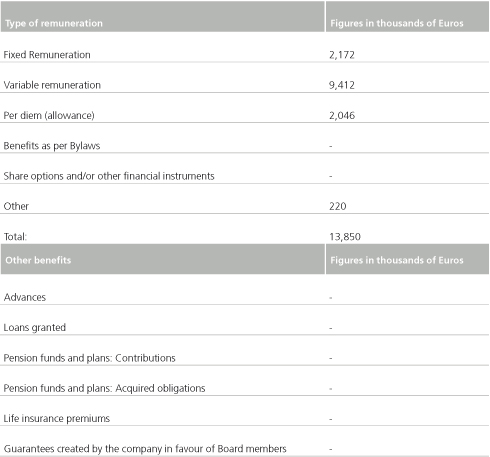
b) Remuneration payable to members of the company’s Board of Directors for posts held on other Boards of Directors and/or within the senior management of other companies of group:
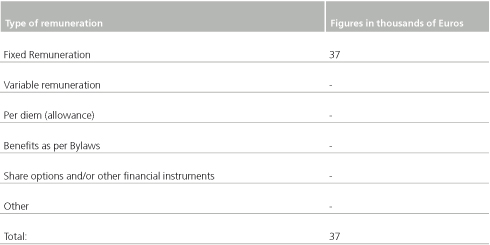
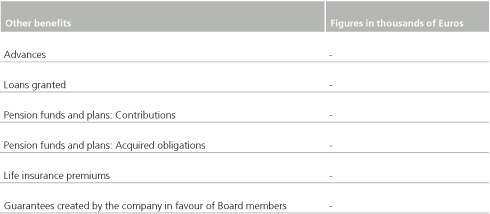
c) Total remuneration by type of director:
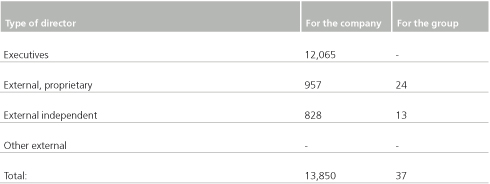
d) Profit attributed to the parent company:

B.1.12. Identity any senior management staff that are not also executive board members, and indicate the total remuneration payable thereto during the financial year:
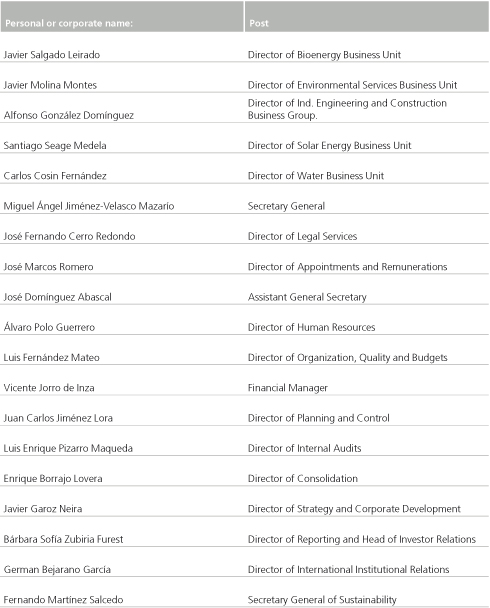
Remuneración total alta dirección (en miles de euros). 13,574
B.1.13. Identify, on an aggregate basis, whether members of the company’s or group’s senior management team, including executive directors, are afforded guarantees or golden parachute clauses in the event of dismissal or changes of control. Indicate whether these contracts must be communicated to, and/or approved by the governing bodies of the company or its group:


Is the General Assembly informed of the clauses?
No.
B.1.14. Describe the process for establishing the remuneration of Board members and the relevant provisions of the Bylaws.
Process for establishing the remuneration of Board members and relevant Bylaws
Established by the Appointments and Remuneration Committee, Art. 39 of the Bylaws, Remuneration Policy Report for company directors presented to the General Shareholders’ Meeting.
Indicate whether the following decisions must be approved by plenary session of the Board:
The proposal of the top executive of the company, the appointment and possible
Termination of the top management, and their compensation clauses.
Yes.
Remuneration of board members, including, in the case of executive members, the additional considerations for their executive duties and other contract conditions.
Yes.
B.1.15. Indicate whether the Board of Directors approves a detailed remuneration policy and explain the matters covered therein:
Amount of fixed remuneration components, (itemised, if possible), of allowances for participation on the Board and its committees and an estimation of the resulting annual fixed remuneration.
Yes.
Variable remuneration items.
Yes.
Main characteristics of the benefits system, with an estimation of their annual amount or equivalent cost.
Yes.
Conditions that must be contained within the contracts of those who perform senior management functions as executive directors.
Yes.
B.1.16. Indicate whether the Board submits a report on the directors’ remuneration policy to the advisory vote of the General Shareholders’ Meeting, as a separate item on the agenda. If so, explain those aspects of the report concerning the remuneration policy as approved by the Board for forthcoming years, the most significant departures in such policies compared to that applied during the financial year in question and an overall summary of how the remuneration policy was applied over the financial year in question. Outline the role played by the Remuneration Committee and, if external consultancy was sought, the identity of the external consultants that provided it.
Yes.
Issues covered in the remuneration policy report
The 2012 financial year Appointments and Remunerations Committee issued reports on:
The follow-up and evolution of remunerations of the members of the Board of Directors and the company’s top management.
The proposal of remunerations for the members of the Board of Directors and the company’s top management.
The preparation of the relevant information to be included in the financial statement.
The proposal to the Board of Directors for the co-optation appointment of board member Mr. Claudi Santiago Ponsa, following the resignation of Mr. Carlos Sebastian Gascón.
The proposal on the admission Mr. Ricardo Martínez Rico to the Audits Committee.
The proposal on the admission of Mr. José Borrell Fontelles as Chairman of the Appointments and Remunerations Committee (marking the completion of the number of independent board members joining said committees in light of the termination of Mr. Carlos Sebastian Gascón), following the renouncement of Ms. Mercedes Gracia Díez as its Chairperson, since she is still member of the Appointments and Remunerations Committee.
The proposal on the admission of Ms. Mercedes Gracia Díez as Chairperson of the Audits Committee, which was agreed upon at the meeting of said Committee on May 3, 2012, following the renouncement of Mr. Carlos Sebastian Gascón.
The proposal to the Board of Directors for the approval of the Annual Report on the Policy of Remuneration of Administrators.
The report verifying adherence to the conditions entailed in the appointment of board members and their characteristics and type.
The proposal to the Board of Directors reporting on the remuneration of the members of the board of directors and the Chief Executive.
Reports on comparative salaries and market researches by independent experts.
Role played by the Remuneration Committee
Preparation of the proposal instigated the Board, stating grounds.
Did the company seek external consultancy?
Yes.
Identity of external consultants
Three independent external consultancy firm
B.1.17. Indicate, if applicable, the identity of the members of the Board of Directors who also serve as Board of Administration members, executives or employees of companies that hold significant shareholdings in the listed company and/or in entities belonging to its business group:
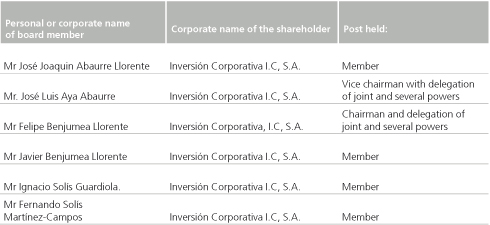
Provide details, as the case may be, of any relevant relations other than those contemplated in the previous section, between members of the Board of Directors and significant shareholders and/or group entities:
Personal or corporate name of the Board member
Mr. Felipe Benjumea Llorente
Personal or corporate name of related significant shareholder
Finarpisa, S.A.
Description of relationship
Chairperson of Board.
B.1.18. Indicate whether any of the rules and regulations of the board were modified during the financial year
No.
B.1.19. Indicate the procedures for the appointment, re-election, evaluation and removal of Board members. Provide details of the competent bodies, the processes to be followed and the criteria employed in each of the procedures.
The Appointments and Remunerations Committee is the competent body in all cases and provides the Board of Directors with its duly substantiated proposal, applying the criteria of independence and professionalism as established in the regulations governing the Board and the Committee.
The performance of the board members and of the executive board members is evaluated on the proposal of the Appointments Committee through a substantiated report filed to the Board at its meeting of the subsequent first quarter, after the closing of the previous exercise and upon obtaining or at least knowing the estimate of the accounts closure for the exercise and receiving the report from the auditor, which are essential as evaluation criteria.
On December 2, 2002, the Audits Committee was formed and on February 24, 2003, the Appointments and Remunerations Committee was also formed. On the same date, the Board of Directors prepared a proposal to modify the Bylaws for the purpose of incorporating the forecasts relating to the Audits Committee, the proposal of the Regulations on the development of Shareholders Assemblies, the partial modifications to the Regulations of the Board of Directors and, finally, the Regulations on the internal system of the Audits Committee and of the Appointment and Remunerations Committee, approved by the General Assembly on June 29, 2003.
In February 2004 the composition of both commissions was modified for the purpose of permitting independent board members from outside the Company to become members of those commissions. Consequently, the Audits Committee and the Appointments and Remunerations Committee were integrated by non-executive board members (with the exception of the coordinator who is member of the board of directors and of the Audits Committee), majority being independent, in accordance with the stipulations in Law on Financial Systems Reform Measures. As a result, the first two independent board members were appointed by the Board of Directors since there was still, logically, no appointment committee. Said independence is also ratified on annual basis by the Appointments Committee. Upon its creation, the proposal for the appointment of board members became part of its competence, and since then it is the aforementioned committee that has made the proposals to the Board of Directors.
Regarding the procedure for selecting and appointing independent members of the board, the Appointments and Remunerations Committee is the organ responsible for selecting the profiles that best represent the needs of the various interest groups among professionals from various fields of expertise and of national and international acclaimed prestige. The procedure for selecting them is based on meritocracy and on the intent to cover any vacancy with professional profiles and not linked to special interests.
Thus, the Appointments and Remunerations Committee annually assesses procedures to ensure compliance with the conditions met for the appointment of a board member and the character and type assigned thereto, including the information into the annual Corporate Governance Report. The Appointments Committee shall likewise ensure that the selection procedures for filling in vacancies do not suffer from implicit biases that may hinder the inclusion of females meeting the required profile into the potential candidates thus preventing the selection of female directors. Its functions also include that of informing the Board of Directors on the appointments, re-elections, terminations and remunerations of the Board members and their posts, as well as on the general policy remuneration and for the top management and to first inform the Assembly of all the proposals that the board of directors may formulate for the appointment or termination of board members, even in cases of co-optation, by the Board of Directors itself.
Regarding the above, every year the External Auditors issue a report on the independent verification of the Corporate Governance Annual Report issued by Abengoa S.A., assessing to ensure that its contents are in line with both the stipulations of recommendations of the report issued by the Special Work’s group on good governance of listed companies (Uniform Good Governance Code) as well as the modifications enforced by Law 2/2011 of Sustainable Economy of March 4.
B.1.20. Indicate the cases in which Board members are obliged to resign.
Directors are removed from office when the term for which they were appointed comes to an end, and in all other cases deemed appropriate by the applicable law, the Bylaws or these Regulations.
Board Members are bound to surrender their posts to the Board of Directors and to sign, should the Board deem it convenient, the relevant resignation in the following cases:
- If they are involved in any of the supposed incompatibilities or prohibitions envisaged by law.
- If severely punished by any public authority for infringing upon their obligations as Board Members.
- Should the Board itself request it so for having infringed upon their obligations as Board Members.
Thus, Article 13 (Board Member Termination) of the Board of Director Regulations establishes that:
- Directors are removed from office when the term for which they were appointed comes to an end, and in all other cases deemed appropriate by the applicable law, the Bylaws or these Regulations.
- Board Members are bound to surrender their posts to the Board of Directors and to sign, should the Board deem it convenient, the relevant resignation in the following cases:
- If they are involved in any of the supposed incompatibilities or prohibitions envisaged by law;
- If severely punished by any public authority for infringing upon their obligations as Board Members;
- Should the Board itself request it so for having infringed upon their obligations as Board Members;
- When the period expires or duty is terminated, whatever the reason, said board member may not render any services to any other competing entity for a period of two years, except if the Board of Directors release him/her from this obligation or shortens the duration.
B.1.21. Explain whether the function of chief executive of the company falls upon the Chairman of the Board of Directors. If so, indicate the measures taken to limit the risks associated with the concentration of powers in one person:
Yes.
Measures to limit risks
Explain the division of functions
In accordance with the provisions of article 44 bis of the Company’s Bylaws, on December 2, 2002 and on February 24 2003, the Board of Directors set up the Audits Committee and the Appointments and Remunerations Committee, respectively.
These committees are vested with the necessary non-delegable powers inherent in the responsibilities assigned them by law, the Bylaws and their respective internal regulations, thus rendering as organs of control and supervision of issues within their power.
Both are presided over by an independent, non-executive board member, and are comprised of a majority of independent and non-executive board members.
On December 10, 2007, the Board of Directors decided to appoint Mr. José B. Terceiro Lomba (representing Aplicaciones Digitales SL), coordinator-board member, as Executive Vice-Chairman of the Board of Directors, with the consent of all the other board members and especially the independent members.
On October 25, the Board of Directors also decided to appoint Mr. Manuel Sanchez Ortega as CEO sharing his executive duties with Mr. Felipe Benjumea Llorente The existence of three executive board members, according to the above, within an ample majority of independent or external board members results in the effective control over the decisions of the top executive, thus preventing the concentration of power in the top executive, encouraging decision-making and ensuring the best functioning of the company governance.
Indicate and, as the case may be, explain whether rules were established to empower one of the independent Board members to request the convening of a board meeting, or to include new items in the agenda, in order to coordinate and echo the concerns of external board members and to oversee the assessment by the Board of Directors.
Explanation of the Rules and Regulations
The Board of Directors currently consists of fifteen members. The Regulations of the Board of Directors govern the composition, functions and internal organization of the governing body. The company also has an Internal Code of Conduct that bounds the Board of Directors, the senior management and all other employees deemed affected, by virtue of the positions or powers that may be held in matters relating to the Stock Market. The Regulations of the General Assembly of Shareholders governs the formal aspects and the internal system for holding shareholders’ meetings. Lastly, the Board of Directors is assisted by its Audits Committee and the Appointments and Remunerations Committee, both of which have their own respective Internal Regulations. All these rules and regulations are brought together in a consolidated text of the company’s Internal Good Governance Rules, available on the company’s website, www.abengoa.es and www.abengoa.com. Since its inception, the Appointments and Remunerations Committee has worked towards analyzing the company’s governing bodies’ structure and adapting it to corporate governance recommendations, with particular attention to the historic and special configuration of said bodies within Abengoa. In February 2007, based on this analysis, the Committee recommended the creation of the post of coordinating director, and the elimination of the Advisory Committee to the Board of Directors. The first measure was in order to incorporate the most recent corporate governance recommendations, produced in Spain in 2006; and the second, because it was considered that said body had fulfilled the function for which it was originally created and that its coexistence with the corporate bodies could create situations of conflict of competences. Both proposals were approved at a meeting of the Board of Directors held in February 2007 and at the General Shareholders’ Meeting held on April 15 of the same year, and Mr. José B. Terceiro was appointed (on behalf of Aplicaciones digitales, S.L.) as coordinating board member, in his capacity as independent. On a final note, in October 2007 the Committee proposed that the Board accepts the resignation of Mr. Javier Benjumea Llorente from his position as Executive Vice-Chairman, with the consequent revocation of his delegated powers, and likewise accept the appointment of a new natural person to represent Abengoa and the Focus-Abengoa Foundation in entities or companies in which they have an appointed position.
The Committee then decided to revisit the study of the number and characteristics of the Vice-Chairman of the Board of Directors within the current structure of governing bodies.
As a result, the Committee thought it necessary that the powers of the Vice-Chairman of Abengoa be restricted to those conferred under the Spanish Corporations Act as regard the material representation of the company on the one hand, and as balance to the Chairman’s functions on the Board of Directors, on the other. On this basis, it considered that the coordinating board member – with the functions assigned thereto by virtue of the decisions taken by the Board of Directors (February 2007) and the General Shareholders’ Meeting (April 2007) – was the ideal figure, given the corporate governance recommendations and the company structure, as well as the composition and diversity of its directors. The coordinating board member has already been entrusted with the task of coordinating the concerns and motivations of the other Board members, and empowered to convene Board meetings and to include new items on the agenda. In its role as the visible protector of the interests of the Board members, it holds more of a de facto than of a de jure position on the Board, such that it seemed appropriate to confirm and expand this representation by making the post both institutional and organic. For the reasons outlined above, the Committee proposed Aplicaciones Digitales, S.L. (Aplidig, represented by Mr José B. Terceiro Lomba), the current coordinating director, as the new Executive Vice-Chairman to the Board of Directors. In addition, and within the functions of material representation, the Executive Vice-Chairman, jointly with the Chairman of the Board of Directors, has been put forward as the physical representative of Abengoa, in its capacity as the Chair of the Board of the Focus-Abengoa Foundation, as well as in any other foundations and institutions in which the company is or must be represented.
In view of the above, on December 10, 2007, the Board of Directors agreed to appoint Aplicaciones Digitales, S.L. (represented by Mr José B. Terceiro Lomba), the current coordinating director, as Executive Vice-Chairman of the Board of Directors, with the unanimous consent of the independent board members with regards to retaining its position as coordinating board member in spite of its new appointment as Executive Vice-Chairman. In addition, and within the functions of material representation (conferred through a power of attorney granted by the Board of Directors on July 23, 2007), the Executive Vice-Chairman, together with the Chairman of the Board of Directors, was proposed as joint physical representative of Abengoa, in its capacity as the Chair of the Board of Focus-Abengoa Foundation, as well as in any other foundations and institutions in which the company is or must be represented.
B.1.22. Are reinforced majorities (different from legal majorities) required for any type of decision?
No.
Indicate how the decisions of the Board of Directors are taken, stating, at least, the minimum quorum and the types of majorities required to take the decisions:
Description of Decision:
All, except those legally reinforced.


Description of Decision:
Delegation of powers


B.1.23. Explain whether there are specific requirements, other than those relating to Board members, to be appointed Chairman.
No.
B.1.24. Indicate whether the Chairman has a deciding vote:
Yes.

B.1.25. Indicate whether the bylaws or board regulations establish any age limit on board members:
No.

B.1.26. Indicate whether the bylaws or board regulations establish a limited mandate for independent board members:
No.

B.1.27. In the event that there are few or no female directors, explain the reasons and the initiatives put in place to remedy the situation.

In particular, indicate whether the Appointments and Remuneration Committee has established procedures to ensure that selection processes do not suffer from implicit biases that hamper the selection of female Board members, and whether female candidates who meet the required profile are deliberately sought:
Specify the main procedures

B.1.28. Indicate whether there are any formal processes in place for granting proxies at Board meetings. If so, provide brief descriptions:
None.
The second section of Article 10 of the Regulations of the Board of Directors establishes the following:
“Each Board Member may confer his/her representation upon another Board Member without it limiting the number of representations that each may hold for attendance to the Board. The representation of the absent Board Members may be conferred in writing by any means whatsoever, including telegram, telex or telefax addressed to the Chair.”
B.1.29. Indicate the number of Board meetings held during the financial year. Likewise indicate, as the case may be, the number of times the Board met without the Chairman in attendance:

Indicate the number of meetings held by the different Board committees during the financial year:
Number of meetings of the Executive or Delegate Committee
Not applicable.
Number of meetings of the Audits Committee
7
Number of meetings of the Appointments and Remunerations Committee
2
Number of meetings of the Appointments Committee
Not applicable.
Number of meetings of the Remunerations Committee
Not applicable.
B.1.30. Indicate the number of Board meetings held during the year without the attendance of all its members. Proxies granted without specific instructions for the meeting should be treated as non-attendances:
Number of non-attendances of directors during the year 5
% of non-attendances of the total votes cast during the year 2%
B.1.31. Indicate whether the individual and consolidated annual accounts presented to the Board for approval are previously certified:
Yes.
Identify, as the case may be, the people who certified the company’s individual and consolidated accounts for approval by the Board:

B.1.32. Explain, if applicable, the mechanisms established by the Board of Directors to ensure that the individual and consolidated accounts that it prepares are not presented to the General Assembly of Shareholders with reservations and qualifications in the audit report.
The risk control system, the internal audit services and the Audits Committee to which the others report, have been equipped to act as mechanisms of frequent and regular control and supervision. They prevent, identify and, where appropriate, resolve potential situations which, if not addressed, could give rise to incorrect accountancy treatment. The Audit Committee, it receives regularly of the external auditor the information about the Plan of Audit and the results of his execution and, checks that the high direction bears his recommendations in mind.
B.1.33. Is the secretary to the Board also a board member?
No.
B.1.34. Explain the procedures for the appointment and removal or termination of the Secretary to the Board, indicating whether they are proposed by the Appointments Committee and approved by plenary session of the Board.
Appointment and Removal Procedure
Proposal from the Appointments and Remunerations Committee, stating ground

Does the Secretary to the Board have special responsibility for ensuring that the recommendations on good governance are followed?
Yes.
B.1.35. Indicate, if applicable, the mechanisms established by the company to preserve the independence of the auditor, of financial analysts, of investment banks and of rating agencies.
The article 27 of the regulation of the board of directors establishes as function of the audit committee to assure the independence of the external auditor, which includes that one assures the review of the provision of services, the limits to the concentration of the business of the auditor, and in general, other procedure established to assure the independence of the auditors. In relation with the financial analysts and investment banks, the company supports an internal procedure of request of three offers for the contracting of the same ones, in turn the company elaborates a letter of mandate where there are established the precise terms of the contracted work. In what concerns the agencies of qualification we possess the qualification of three current agencies, his corresponding letter of mandate.
B.1.36. Indicate whether the company changed its external auditor during the financial year. If so, identify the incoming and outgoing auditors:
Yes.

In the event of disagreements with the outgoing auditor, please provide details:
No.
B.1.37. Indicate whether the audit firm carries out other, non-audit work for the company and/or its business group. If so, state the total fees paid for such work and the percentage this represents of the fees billed to the company and/or its business group:

B.1.38. Indicate whether the audit report on the annual accounts for the previous financial year contains reservations or qualifications. If so, detail the reasons given by the Chairman of the Audit Committee to explain the content and scope of such reservations or qualifications.
No.
B.1.39. State the number of consecutive years during which the current audit firm has been auditing the annual accounts of the company and/or its business group. Likewise, indicate how many years the current audit firm has been auditing the accounts as a percentage of the total number of years over which the annual accounts have been audited:

B.1.40. Indicate any equities that company Board members hold in capitals of other entities engaged in the same, analogous or complementary type of business as that which constitutes the corporate purpose of either the company or its business group, insofar as these have been communicated to the company. Likewise indicate the positions or functions they exercise within such companies:
None.
B.1.41. Indicate whether there is a procedure whereby directors may seek external consultancy.
Details of the procedure:
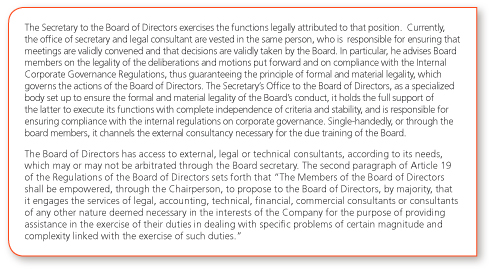
B.1.42. Indicate whether there is a procedure through which board members can obtain the information needed to prepare well in advance of meetings of the governing bodies and, if there is, give details:
Yes.
Details of the procedure:

B.1.43. Indicate whether the company established rules that oblige directors to report and, where appropriate, to resign, in cases that may be damaging to the image and reputation of the company.
Yes.
Explain the rules

B.1.44. Indicate whether any member of the Board of Directors has informed the company that s/he has been sentenced or formally accused of any of the offences stipulated in Article 124 of the Spanish Public Limited Companies Act:
No.
Indicate whether the Board of Directors has analysed the case. If so, explain the decision taken regarding whether or not the director should remain in his/her post, giving reasons.
Not applicable.

B.2. Committees of the Board of Directors
B.2.1. List all the committees of the Board of Directors and the members thereof:
a) Audits Committee
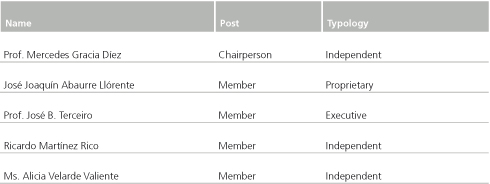
b) Appointments and Remunerations Committee
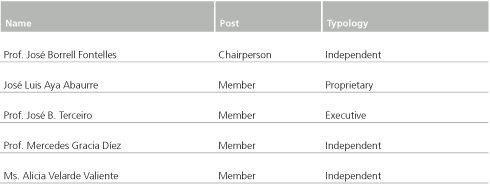
B.2.2. Indicate whether the following functions are vested in the Audits Committee:
Monitoring the preparation process and the integrity of the financial information on the company and, as the case may be, the group, verifying compliance with legal requirements and the correct application of accounting criteria, and appropriately specifying the scope of consolidation.
Yes.
Frequently assessing the internal control and risk management systems, so that the main risks are adequately identified, managed and made known.
Yes.
Ensuring the independence and efficacy of the internal audit function; proposing the selection, appointment, renewal and removal of the head of the internal audit service; proposing the budget for such service; receiving regular information on its activities; and checking to ensure that the senior management takes the conclusions and recommendations of its reports into account.
Yes.
Establishing and overseeing a mechanism that enables employees to communicate - confidentially and, when deemed appropriate, anonymously - any possible irregularities they may observe within the company, particularly in the area of finance and accounting.
Yes.
Presenting proposals to the Board of Directors for the selection, appointment, re-election and replacement of the external auditor, as well as the conditions under which it is contracted.
Yes.
Regularly receiving information on the audit plan and on the implementation results from the external auditor, and ensuring that the senior management takes the recommendations into account.
Yes.
Ensuring the independence of the external auditor.
Yes.
In the case of groups, helping to ensure that the group auditor also conducts the audits for individual companies in the group.
Yes.
B.2.3. Describe the rules of the organization and how it functions; also outline the responsibilities of each of the Board Committees.
Committee name
1st Appointments and Remunerations Committee
Brief description
In compliance with the requirements set forth in the Financial System Reforms Law, the Appointments and Remunerations Committee is comprised of a majority of non-executive directors. Likewise, in accordance with the provisions in Article 2 of its Internal Regulations, the position of Chairman of the Committee shall be held by a non-executive board member.
Functions
The powers and duties of the Appointments and Remuneration Committee include the following:
- Report to the Board of Directors on matters relating to the appointment, reelection, retirement, removal and remuneration of the members of the Board of Directors and the Advisory Board and on general policy relating to remuneration and incentives for the aforesaid members and executive officers.
- Prepare the proposals that the Board of Directors puts to the General Meeting of Shareholders for the appointment or removal of Directors, including those appointed by the Board of Directors to fill casual vacancies by co-option.
- Produce an annual report on the activities of the Committee of Appointments and Remuneration, to be included in the Directors’ Report
- Evaluate the skills, knowledge and experience required by the Board; to define the abilities and functions required by candidates to cover vacancies; and to assess the time and dedication required by Board members to fully carry out their functions;
- Examine and organise the succession of the Chairman and CEO and make proposals to the Board, as appropriate, so that any succession occurs in an orderly and well planned way;
- Inform the Board of any appointments or resignations of senior managers proposed by the CEO.
- Inform the Board about gender diversity issues.
- Propose to the Board of Directors:
- The remuneration policy for directors and senior management;
- The individual remuneration of the directors and the approval of the contracts that the Company signs with each executive director;
- The basic conditions of contracts for senior management.
- Ensure that the remuneration policy established by the Company is followed.
- Consult with the Chairman or CEO of the Company, especially in relation to issues connected to executive directors and senior management.
- Analyse applications from any director, when taking potential candidates into consideration to cover director vacancies.
Organization and function
The Appointments and Remunerations Committee shall meet as often as necessary to perform its functions, but at least once every six months.
A quorum is deemed to exist when the majority of its members are present. Proxies may only be granted to non-executive directors.
The Committee shall meet on the occasions necessary to fulfil its functions and, at least, once a quarter. In 2012 it met on two occasions.
The decisions taken shall be deemed valid when the majority of the members of the Committee, present or represented by proxy, vote in favour. Situations of tie shall be resolved by the decisive vote of the Chairman.
Committee name
Audits Committee.
Brief description
In compliance with the requirements set forth in the good governance regulations and, especially, in the Financial System Reforms Act, the Audits Committee is comprised of a majority of non-executive directors. Likewise, in accordance with the provisions of Article 2 of its Internal Regulations, the office of Chairman of the Committee shall be held by a non-executive director.
Functions
The powers and duties of the Audit Committee include the following:
- Prepare the annual accounts and half-yearly and quarterly financial statements that must be submitted to regulatory bodies and market monitoring bodies, making reference to the internal control systems, the control mechanisms to monitor implementation and compliance through internal audit procedures and, where appropriate, the accounting principles applied.
- Inform the Board of Directors of any changes in accounting principles, balance sheet risk and off-balance sheet risk.
- Report to the General Meeting of Shareholders on questions that fall within its area of competence.
- Submit proposals to the Board of Directors for the appointment of external auditors to be approved by the General Meeting of Shareholders.
- Supervise internal audit procedures. The Committee shall have full access to internal auditing and shall report on the process of selection, appointment, reappointment, removal and remuneration of the internal audit director and on the department’s budget.
- Have full knowledge of the Company’s financial information process and internal control systems.
- Serve as a channel of communication with the external auditors for information on questions that could jeopardise the independence of the latter and any other matters relating to the audit process.
- Summon Directors to meetings of the Committee, at its discretion, to report on such matters as the Audit Committee may determine.
- Produce an annual report on the activities of the Audit Committee to be included in the Directors’ Report.
I. In relation to internal control and the information systems:
- Supervise the preparation process and the integrity of the financial information relating to the Company and to the Group, as appropriate, ensuring compliance with regulatory requirements, the appropriate scope of consolidation and the correct application of accounting criteria.
- Periodically review the internal control and risk management systems so that the principal risks are appropriately identified, managed and reported.
- Supervise the internal audit function, through full access to it, and monitor and supervise its independence and effectiveness; propose the selection, appointment, re-election and removal of the manager of the internal audit service; propose the budget for this service and set the remuneration for its manager; receive periodic information on its activities and the budget for the service; and verify that senior management takes into account the conclusions and recommendations of its reports.
- Establish and supervise a mechanism that allows employees to confidentially and anonymously, if appropriate, communicate potential irregularities, especially financial and accounting, which they may identify within the Company, proposing the appropriate corrective measures and approvals to the Board of Directors.
- Summon any employee or director of the Company, including appearances without the presence of any other manager.
- The Audit Commission shall notify the Board prior to adopting the corresponding decisions on the following issues:
- The financial information that the Company must periodically publish, as a listed company. The Commission must ensure that the interim accounts are prepared using the same accounting criteria as the annual accounts, and therefore consider the relevance of a partial review by the external auditor.
- The creation or acquisition of shareholdings in special purpose vehicles or entities registered in countries or territories considered as tax havens, as well as any other similar transactions or operations that, due to their complexity, could reduce the transparency of the Group.
- Related operations.
- Supervise compliance with the Internal Code of Conduct in relation to the securities market and the policy on the Use of Relevant Information and the rules of corporate governance.
II. In relation to the external auditor:
- The proposals to select, appoint, re-elect and substitute the external auditor, as well as the conditions of its contract, shall be presented by the Board of Directors to the Shareholders’ General Meeting.
- Receive information about the audit plan and its results from the external auditor on a regular basis and verify that senior management takes its recommendations into account.
- Ensure the independence of the external auditor and therefore:
- That the Company notifies the CNMV of the change of auditor as a significant event and accompanies this disclosure with a statement about the existence of disputes with the outgoing auditor and the content of such disputes, if they exist;
- That it ensures that the Company and the auditor comply with the prevailing regulations on the provision of services, other than audi t serv i ces , the res t r i c t ions on the concentration of business with an auditor and, in general, any other regulations established to ensure auditors’ independence;
- In the case of the resignation of an external auditor, to examine the circumstances that may have caused it.
- Support the Group auditor in taking responsibility for the audits of the companies that comprise it.
Organization and function
The Audits Committee shall meet as often as necessary to perform its functions and at least once every quarter. In 2012 it met on five occasions and two written session.
The Audits Committee shall be deemed validly convened when the majority of its members are present. Proxies may only be granted to non-executive directors.
B.2.4. Indicate the powers of each committee regarding consultancy, consultation and, as the case may be, conferment:
Committee name
Appointments and Remunerations Committee
Brief description
To Report to the Board of Directors on matters relating to the appointment, reelection, retirement, removal and remuneration of the members of the Board of Directors and the Advisory Board and on general policy relating to remuneration and incentives for the aforesaid members and executive officers, prepare the proposals that the Board of Directors puts to the General Meeting of Shareholders for the appointment or removal of Directors, including those appointed by the Board of Directors to fill casual vacancies by co-option, produce an annual report on the activities of the Committee of Appointments and Remuneration, to be included in the Directors’ Report Evaluate the skills, knowledge and experience required by the Board; to define the abilities and functions required by candidates to cover vacancies, and to assess the time and dedication required by Board members to fully carry out their functions, examine and organise the succession of the Chairman and CEO and make proposals to the Board, as appropriate, so that any succession occurs in an orderly and well planned way, inform the Board of any appointments or resignations of senior managers proposed by the CEO, inform the Board about gender diversity issues, propose to the Board of Directors: i) the remuneration policy for directors and senior management; ii) the individual remuneration of the directors and the approval of the contracts that the Company signs with each executive director; iii) the basic conditions of contracts for senior management, ensure that the remuneration policy established by the Company is followed, consult with the Chairman or CEO of the Company, especially in relation to issues connected to executive directors and senior management, applications from any director, when taking potential candidates into consideration to cover director vacancies.
Committee name
Audits Committee.
Brief description
Prepare the annual accounts and half-yearly and quarterly financial statements that must be submitted to regulatory bodies and market monitoring bodies, making reference to the internal control systems, the control mechanisms to monitor implementation and compliance through internal audit procedures and, where appropriate, the accounting principles applied, inform the Board of Directors of any changes in accounting principles, balance sheet risk and off-balance sheet risk, report to the General Meeting of Shareholders on questions that fall within its area of competence. Submit proposals to the Board of Directors for the appointment of external auditors to be approved by the General Meeting of Shareholders, supervise internal audit procedures, the Committee shall have full access to internal auditing and shall report on the process of selection, appointment, reappointment, removal and remuneration of the internal audit director and on the department’s budget, have full knowledge of the Company’s financial information process and internal control systems, serve as a channel of communication with the external auditors for information on questions that could jeopardise the independence of the latter and any other matters relating to the audit process, summon Directors to meetings of the Committee, at its discretion, to report on such matters as the Audit Committee may determine, produce an annual report on the activities of the Audit Committee to be included in the Directors’ Report.
B.2.5. Indicate whether there are any regulations that govern the Board Committees, references to their availability for consultations, and any amendments that may have been made during the financial year. Also state whether annual reports were voluntarily prepared on the activities of each committee.
Committee name
Appointments and Remunerations Committee.
Brief description
The latest amendments of the Appointments and Remunerations Committee Regulations dated October 24, 2011, are available on the company’s website and at the CNMV. Each committee issues its own annual report on its activities, which is then published as part of the Annual Report.
Committee name
Audits Committee.
Brief description
The latest amendments of the Audits Committee dated October 24, 2011, are available on the company’s website and at the CNMV. Each committee issues its own annual report on its activities, which is then published as part of the Annual Report.
B.2.6. Indicate whether the composition of the Executive Committee reflects the participation on the Board of the different categories of directors:
Not applicable – there is no Executive Committee.
If not, explain the composition of the executive committee
Not applicable – there is no Executive Committee.
© 2012 Abengoa. All rights reserved
